Literary papers | A poem by James K Baxter
Seán McMahon, Curator, Manuscripts, uncovers the story behind a spontaneous poem penned on the back of a protest poster by one of New Zealand's most well-known and controversial literary figures.
Poet, playwright and activist
James K Baxter (born 1926) is one of New Zealand’s most well-known and celebrated writers. He was primarily a poet but also wrote many plays for the theatre. A controversial character Baxter was also known at various points in his life for his conversion to Catholicism, left-wing politics, communal life, particularly with the commune he established at Jerusalem along the banks of the Whanganui River in 1969, and his bouts with alcoholism.
Baxter wrote his first poem at age seven and wrote at a prodigious rate for the rest of his life. He published his first volume of poetry Beyond the Palisade when he was just seventeen years old. He studied for an undergraduate degree for several years at the University of Otago. He continued his associations with universities throughout his life, editing the Canta student magazine at the University of Canterbury and completing his degree at the Victoria University College in Wellington in 1956. In 1966 he was awarded the Robert Burns Fellowship at the University of Otago which enabled him to continue his creative writing.
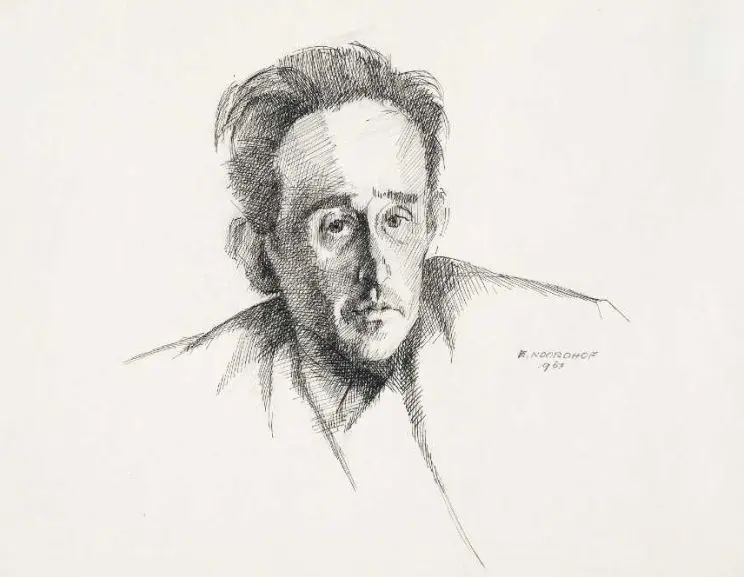
Portrait of James K Baxter, 1967 by Elisabeth Johanna Noordhof. Ref: A-246-001. Alexander Turnbull Library.
The 1960s were a period of social change throughout the world which included the countercultural movement, women’s and civil rights activism, the growth of environmentalism, and anti-Vietnam War protests. Much of this discourse emanated from universities and students were the flag-bearers for many of the marches and rallies which responded to this social change.
Baxter was older than most of these students during this period, but he was a keen supporter of their activities. From a literary standpoint, he authored many poems satirising the government of the day. In his personal life, he often visited prison inmates who had been arrested for protesting and other political activities. He attended marches and supported the left-wing bookshops around New Zealand which became prolific in the late 1960s. Baxter died in 1972 aged forty-six.
Progressive Youth Movement
In 2020, Sarah Lake donated an unpublished Baxter poem Salutation to Tim Shadbolt to the Alexander Turnbull Library. Accompanying this generous deposit is a fascinating backstory of how Lake acquired the poem.
In 1970, Lake was working in the Progressive Youth Movement (PYM) bookshop in upper Cuba Street. The PYM was a left-wing protest organisation that was highly active in Wellington, Auckland and Christchurch. Many university students were part of this organisation, some of them joining in 1965 when it was first established as the Youth Action Committee on Vietnam.
New Zealand joined America in the Vietnam War in late 1965. The service personnel and civilian volunteers continued to fight alongside American and Australian soldiers up until 1972 when New Zealand withdrew the last of its forces from this conflict. This war created debate around the world and in New Zealand on foreign policy issues and an external country’s involvement in other nations' wars. Those frequenting the PYM bookshops were intent on raising awareness about these issues in New Zealand.
Who is Tim Shadbolt?
In writing Salutation, Baxter referred to Tim Shadbolt, the Auckland University student and anti-war activist living in Auckland at the time. He was regularly active in protests, being arrested thirty-three times, serving two prison sentences and five years on periodic detention.
During his university years, he was part of the Radical Eight which was a radical offshoot of that university’s student association. Many of his arrests were for civil disobedience or for not paying his overdue fines (as a result of civil disobedience!).
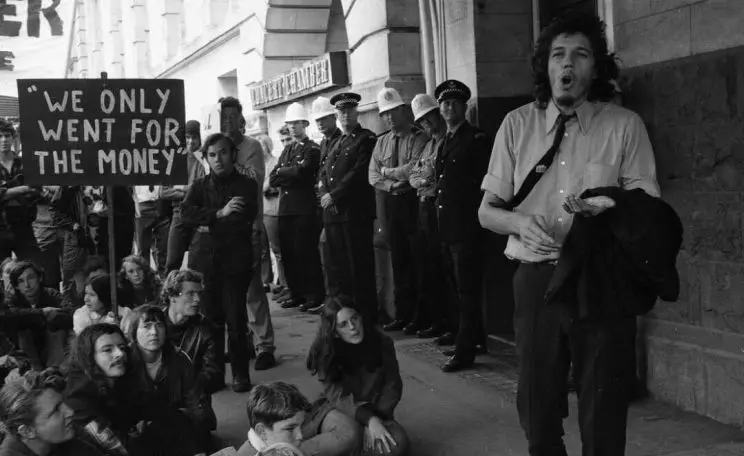
Return of troops, Tim Shadbolt, 1971 by Max Oettli. Ref: 35mm-106319-F. Alexander Turnbull Library.
On the day this poem was written Shadbolt was serving a stint in Mount Crawford prison, wryly termed Mother Crawford’s boarding house in Baxter’s poem, which was situated on the Miramar Peninsula in Wellington.
Baxter attempted to visit Shadbolt in prison but was turned away by the guards. According to Sarah Lake, Baxter called into the Progressive Youth Movement bookshop on Cuba Street when he returned to the city centre. The bookshop sold left-wing books as well as being a local radical action centre where activists, writers, and students met up.
Spontaneous poetry
Baxter was well known for writing poems on the spur of the moment and then gifting them to people. In this poem, he captures the zeitgeist of the contemporary political milieu with lines like ‘Are you a Commy or a queer,’ ‘When were you last on junk?’ and ‘half the Māori leaders are rotting in the clink.’ Succinctly here he has captured race relations in New Zealand, the drug scene from the 1960s, right-wing anti-communist sentiments, homophobia, and the marginalisation of groups on the edge of society.
Unpublished Baxter poem Salutation to Tim Shadbolt
Lake believes Baxter may have gifted the poem Salutation to Tim Shadbolt, to the PYM bookshop to help them with their cause of protesting against the Vietnam War.
The four-stanza rhyming poem is an example of one of Baxter's spontaneous poems. It also may be one of his unpublished poems as it does not appear to be in print. The contents of the poem may have been rewritten into another poem with a different title. Baxter was such a prolific writer of poetry that new unknown poems do surface in archive collections from time to time.
Baxter wrote two versions of this poem. A draft version, and then a final copy which he signed. The text in both poems is similar but the handwriting in the second version is more discernible.
‘Salutation to Tim Shadbolt’ (MS-Papers-12567)
Draft version of Salutation to Tim Shadbolt
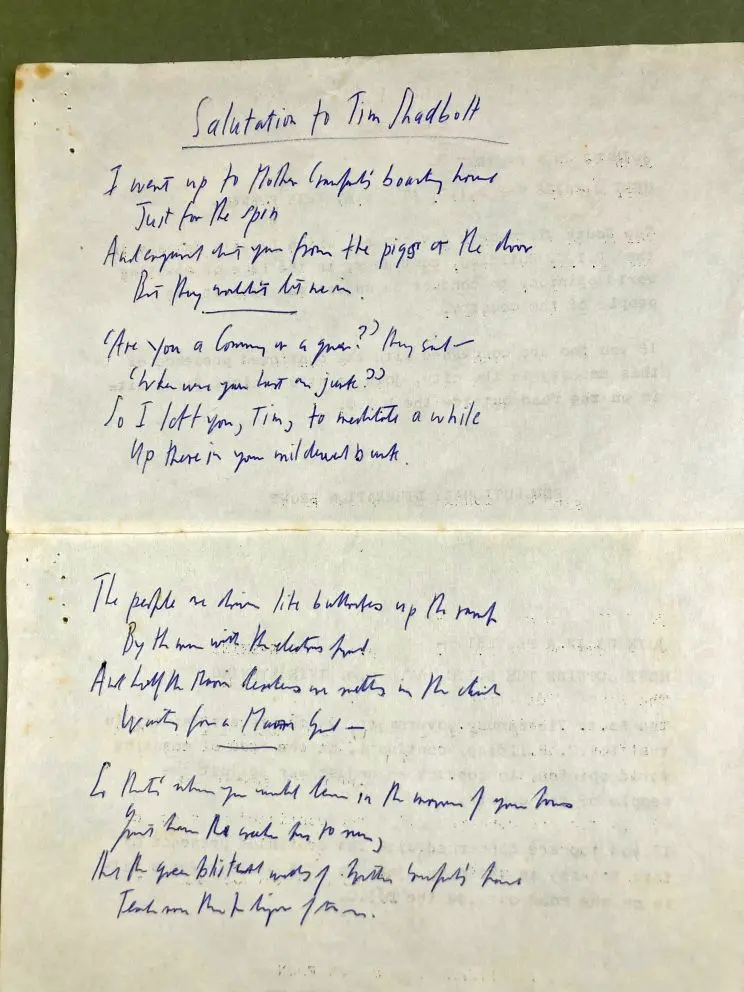
A draft version of Salutation to Tim Shadbolt. Sarah Lake Collection, ca. 1970s. Ref: MS-Papers-12567. Alexander Turnbull Library.
Final signed version of Salutation to Tim Shadbolt
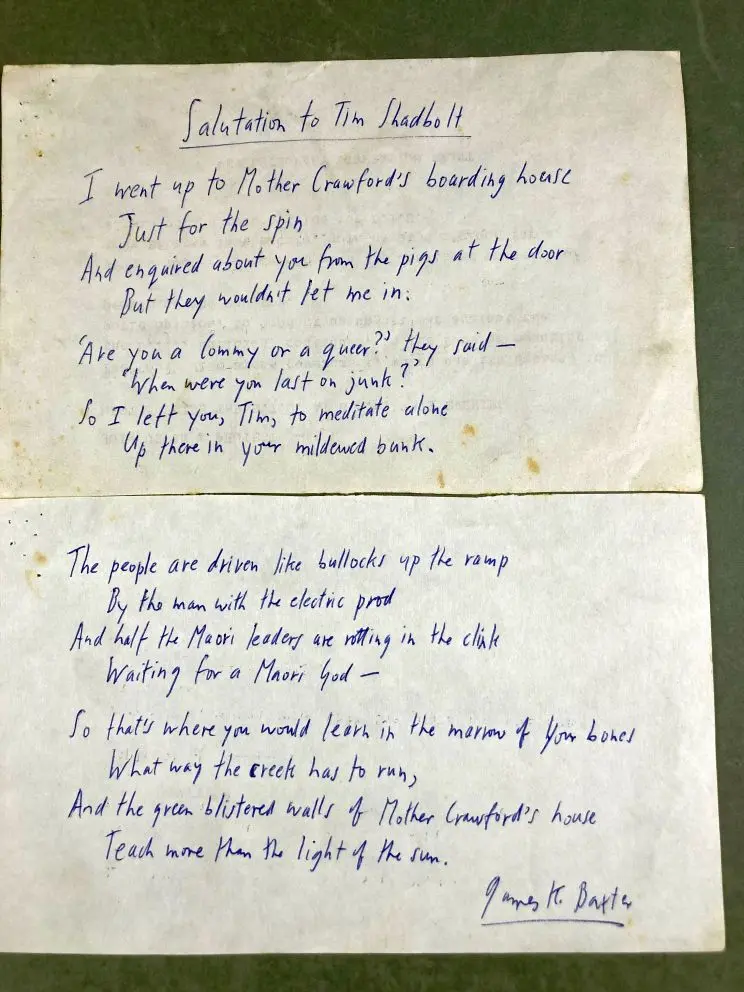
Final and signed version of Salutation to Tim Shadbolt with more discernable handwriting. Sarah Lake Collection, ca. 1970s. Ref: MS-Papers-12567. Alexander Turnbull Library.
Salutation to Tim Shadbolt
I went up to Mother Crawford’s boarding house
Just for the spin
And enquired about you from the pigs at the door
But they wouldn’t let me in.
‘Are you a Commy or a queer?’ they said —
‘When were you last on junk?’
So I left you, Tim, to meditate alone
Up there in your mildewed bunk.
The people are driven like bullocks up the ramp
By the man with the electric prod
And half the Maori leaders are rotting in the clink
Waiting for a Maori God —
So that’s where you would learn in the morrow of your bones
What way the creek has to run,
And the green blistered walls of Mother Crawford’s house
Teach more than the light of the sun.
Both a manuscript and a piece protest ephemera
What is particularly unique about this poem is the writing medium Baxter has chosen to record this poem on. The manuscript paper is a PYM flyer advertising a protest to be held outside the department store D.I.C. on Lambton Quay, Wellington. The flyer notes that the South Vietnamese government was located inside the D.I.C. building hence the chosen location for the rally.
Lake points out that this flyer was among loose papers lying about the shop and presumedly Baxter had none of his writing materials at hand, so he used this event notice to compose the poem.
This means that the item is a dual archive or record as it also serves as an example of advertising or promotional ephemera. For this reason, the manuscripts were of interest to the Library for their content as a poetic manuscript, but also in part as a good example of 1970s protest ephemera.
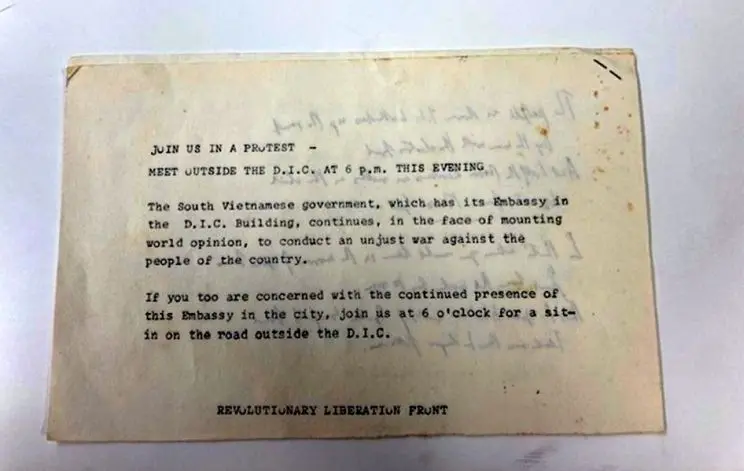
Progressive Youth Movement (PYM) anti-war protest flyer. Sarah Lake Collection, ca. 1970s. Ref: MS-Papers-12567. Alexander Turnbull Library.
Resistance bookshops
The PYM bookshop opened in June 1970 before being closed down after the shop was petrol-bombed and then suffered fire damage in November of the same year. An Evening Post article on 30 November 1970 notes that the bookshop lost its entire stock and fittings valued at $500. It goes on to quote one of the bookshop proprietors who claims a threat was made against the premises a week before the fire in a hotel conversation.
Tim Shadbolt’s Bullshit & Jellybeans goes further, claiming someone associated with the police committed the arson. Nobody was ever charged for the offence.
The PYM bookshop was located at the top of Cuba Street at number 236, near the corner of Abel Smith St (today this location is next door to Fidel's cafe).
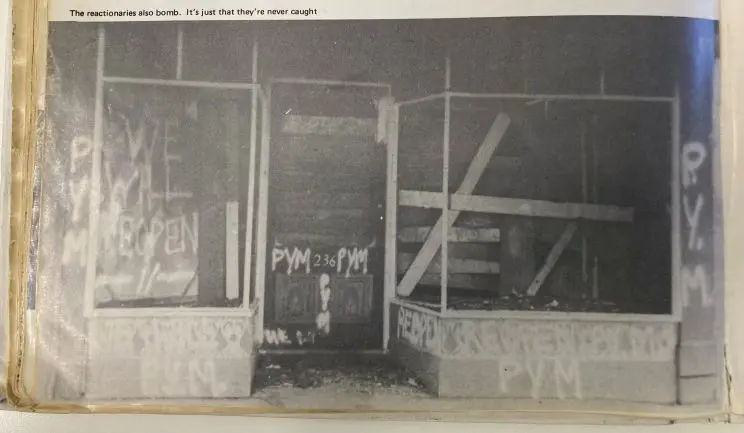
The aftermath of the fire at the Resistance Bookshop in Wellington, November 1970. Tim Shadbolt, Bullshit & Jellybeans, 1971, p.130. Ref: NLNZ ALMA 99125863502836. Alexander Turnbull Library.
The PYM bookshops were also known as a ‘resistance bookshop’ and there were other such bookshops in Auckland and Christchurch. After the fire in the Cuba Street shop, the bookshop re-established itself on Willis Street in 1971. It continued to run as a bookshop until 1976 when it shut permanently.
A brief history of the resistance group and their bookshops appeared in an article in the Victoria University student newspaper Salient in 1973. The journalist covers the operational, publishing, and financial aspects of the bookshops as well as opportunities for their future, while also cautioning against change within the movement and the introduction of `armchair revolutionaries.’
By the 1980s, the large majority of these specialised left-wing bookshops had closed around New Zealand.
Newspaper cutting from the Salient: the student magazine of Victoria University of Wellington, 21 March 1973. Herbert Otto Roth collection. Ref: MS-Papers-12325-09. Alexander Turnbull Library.
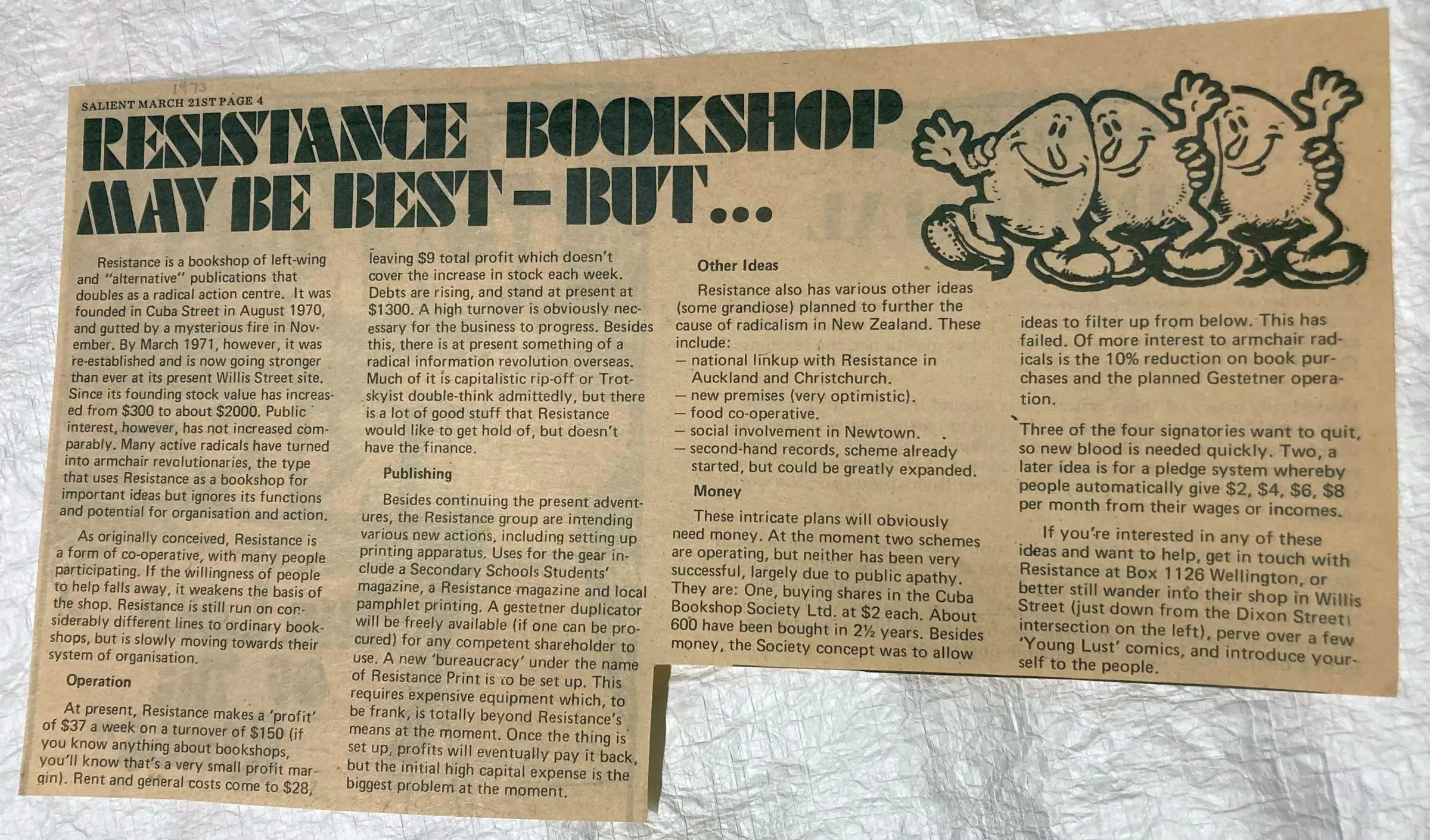
Conclusion
This poem Salutation to Tim Shadbolt nicely exemplifies how a poem can come into creation, in this case on the spur of the moment after a powerful personal experience. It also shows how manuscripts can provide more than one meaning for a researcher, in this instance combing poetry and social commentary. The content is also political in nature, a satire of the Government’s stance on the war in Vietnam during the 1960s and 1970s.
The provenance information provided by the donor, Sarah Lake widens the context further into left-wing politics and the organisations that supported them like the resistance bookshops.
Further research into James K Baxter
For researchers interested in the life of James K Baxter the Library holds many collections with relevant material. The most common manuscripts are letters from Baxter to friends and other writers. Examples of his plays and poems are in the Turnbull Collection as well as photographs and oral history recordings. The largest collection of Baxter papers in New Zealand is held by the Hocken Collections repository at the University of Otago.
James Keir Baxter, 1926-1972, name record with links to all related items
Sarah Elizabeth Lake, 1948-: ‘Salutation to Tim Shadbolt’ (MS-Papers-12567)
For further research, one of the main collections the Library holds relating to the Progressive Youth Movement (PYM) and the resistance bookshops are in the collection of the labour and trade union historian Herbert Otto Roth, ATL-Group-00304. See also the collections of the political activist David Wickham, MS-Group-0392; left-wing supporter Andrew Dodsworth, MS-Group-1658; PYM member Guy Dugdale, ATL-Group-00917; and the collection of Keith Stewart which includes ephemera relating to protest and student movements, MS-Papers-6142.
Sources
Fire guts Cuba St bookseller, Evening Post newspaper. Wellington, 30 November 1970.
The Extraordinary Life of Tim Shadbolt. Bob Harvey. Metro. Accessed online 12 February 2024.
Bullshit & Jellybeans, Tim Shadbolt, 1971. A Taylor, Wellington, N.Z.
Radical Spaces: New Zealand's Resistance Bookshops. Megan Simpson1969-1977. Thesis, Victoria University of Wellington, 2007.
Acknowledgements
Thank you to Sarah Lake, Jay Buzenberg, Mary Hay, and Julie Fenwick.
Literary Papers blog series
The Literary Papers blog series highlights collection items from the Manuscripts Collection at the Alexander Turnbull Library.
Thanks Sean, interesting to see this unpublished poem. I remember both Baxter and Shadbolt visiting the Otago campus in the early 70s.